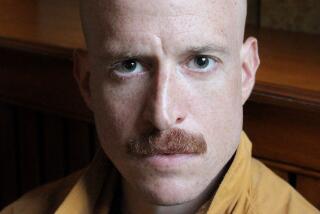One Reader’s Meat Is Another’s Ptertha : THE RAGGED ASTRONAUTS<i> by Bob Shaw (Baen Books: $15.95; 310 pp.) </i>
- Share via
The jacket quotes on “The Ragged Astronauts” are exciting: Gregory Benford says, “This novel signals (Shaw’s) long-awaited major work.” Michael Moorcock says, “The Ragged Astronauts” (is a) story guaranteed to revive a sense of wonder . . . in the most jaded reader.” Gene Wolfe says, “It’s a hard book to put down.” This reviewer found it a hard book not to throw across the room.
I cordially dislike reviewers who write as if theirs were the only possible opinion on the work they are reviewing; hence the above. But “The Ragged Astronauts” is one of the worst books I’ve read in a long time. I would find this less dismaying (clunkers are, after all, a part of life) if I didn’t like and/or admire the work of all the authors quoted above. I know I’m outnumbered; but the driving force of all the plaudits still failed to make me enjoy this book.
The human (although not quite human as we define ourselves) inhabitants of a planet called, simply, Land, are being driven nearly to extinction by a plague of--sentient hostile entities? Mere wind-blown chemical poisons?--called ptertha. The unthinkable must be thought of to avert this final disaster, and the unthinkable is a plan to emigrate from Land to its twin world, Overland. If I felt more kindly toward this book I might call it a page-turner; Shaw has a lively sense of pace.
But I am not feeling kindly. The plot never gets off the ground, as do the ragged astronauts’ frail balloon-craft. The writing is so wooden that the pages creak as you turn them, and the characters are cardboard--which means, straining this metaphor to its limits, that the blocky writing knocks them over at every contact.
The confrontation, for example, between Toller’s real father, whom he has never previously met, and the old man, who during their conversation is quietly committing suicide by sipping poison, is flat and unengaging. This scene is one of the cruxes of the book. Toller is the hero of this epic (which, fate deliver us, is to become a series), and his life has narrowly missed being one of bitterness and despair--caused in large part by not knowing who his father is. The ptertha plague, which ironically gives Toller his way into life, has caused his father--who, excepting his responsibility to his illegitimate son, has been a good and perhaps great man--to end his own life, in bitterness and despair. All this is disposed of by the old man’s saying, “I had many reasons--some of them not altogether selfish--for not acknowledging you, Toller. Do you bear me any ill will?” To which Toller stoically replies, “None, sir.”
The only female person in “Ragged Astronauts” who has more than two or three lines to speak (the runner-up is a fish-monger who lives only for food and sex) is wholly motivated by the craving to bear children. Toller’s musings on her (it takes them most of the book to realize they are in love with each other; meanwhile she is an appalling bitch and he’s dunderheadedly humble and bemused) take the form of seeing her with the light behind her and thinking she’s a goddess, etc. Haven’t we outgrown this kind of nonsense yet?
Those who like hard science-fiction with interesting physical laws and conditions unlike ours to play with, and who have a higher pain threshold for clay-footed writing and automaton characters than I do, may enjoy “The Ragged Astronauts.” For the rest of you, preserve your next-door and downstairs neighbors from the sound of a book walloping off the wall and crashing to the floor. Read something else.
More to Read
Sign up for our Book Club newsletter
Get the latest news, events and more from the Los Angeles Times Book Club, and help us get L.A. reading and talking.
You may occasionally receive promotional content from the Los Angeles Times.








